Review of Xiaomi Mi Box S and a small comparison with Mi Box 3
Hi, Habr! Not so long ago came a new TV set-top box from Xiaomi, which was called Mi Box S. Today’s article is a review of this console and a comparison with its “predecessor”. Look under the cat!

Mi Box S [MDZ-22-AB] is the international version of Mi Box 4, which is a direct continuation of the international version of the set-top box Mi Box 3 [MDZ-16-AB] . It is distinguished from its predecessor by a modified design and a slight improvement in performance.
First of all, let's make a small comparison of the consoles:
As you can see, the difference is not so significant.
Like its predecessor, the MDZ-16-AB, the Mi Box S comes in a cardboard box with bright printing (even the design is similar, only the tones are slightly modified).
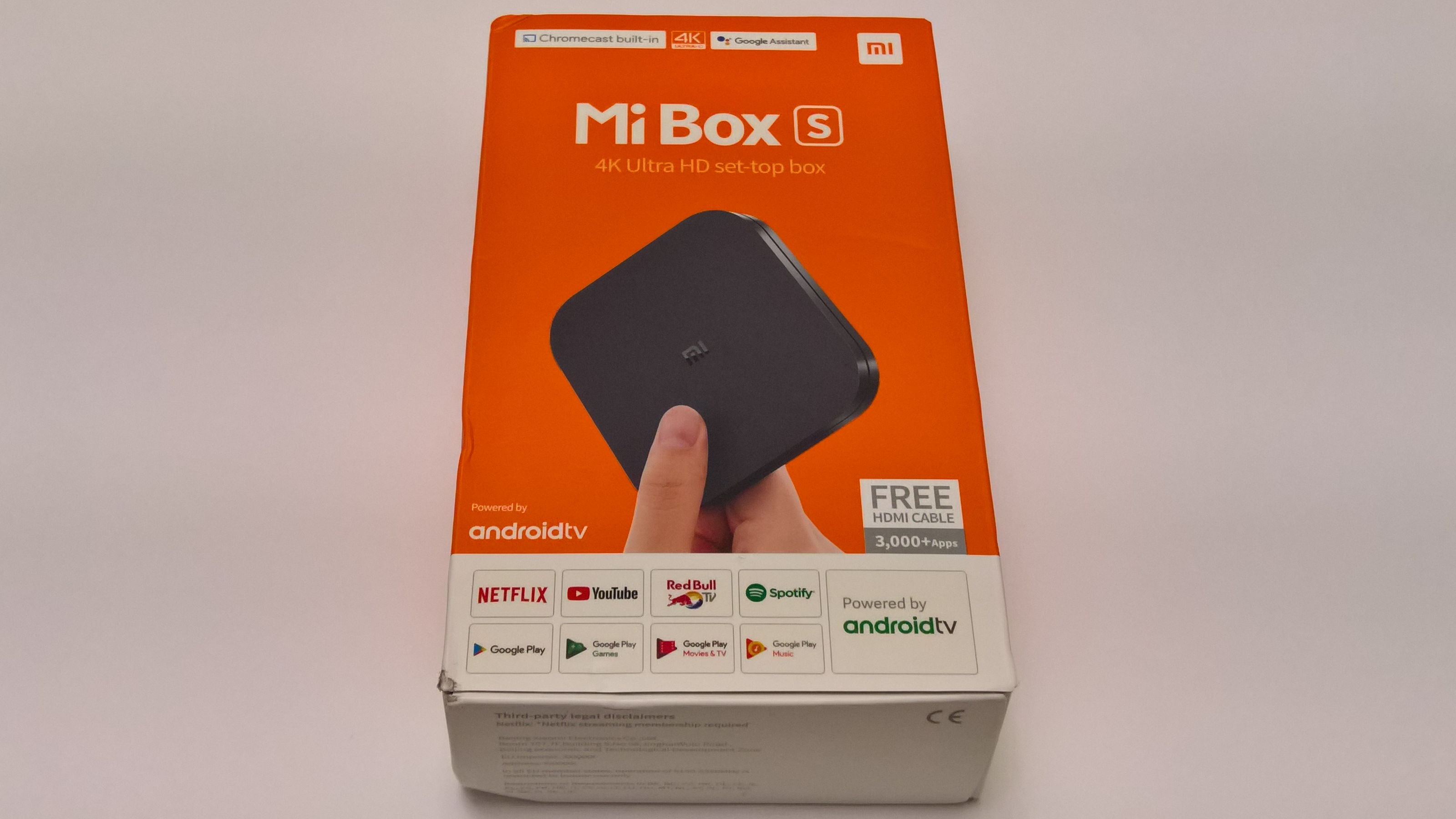
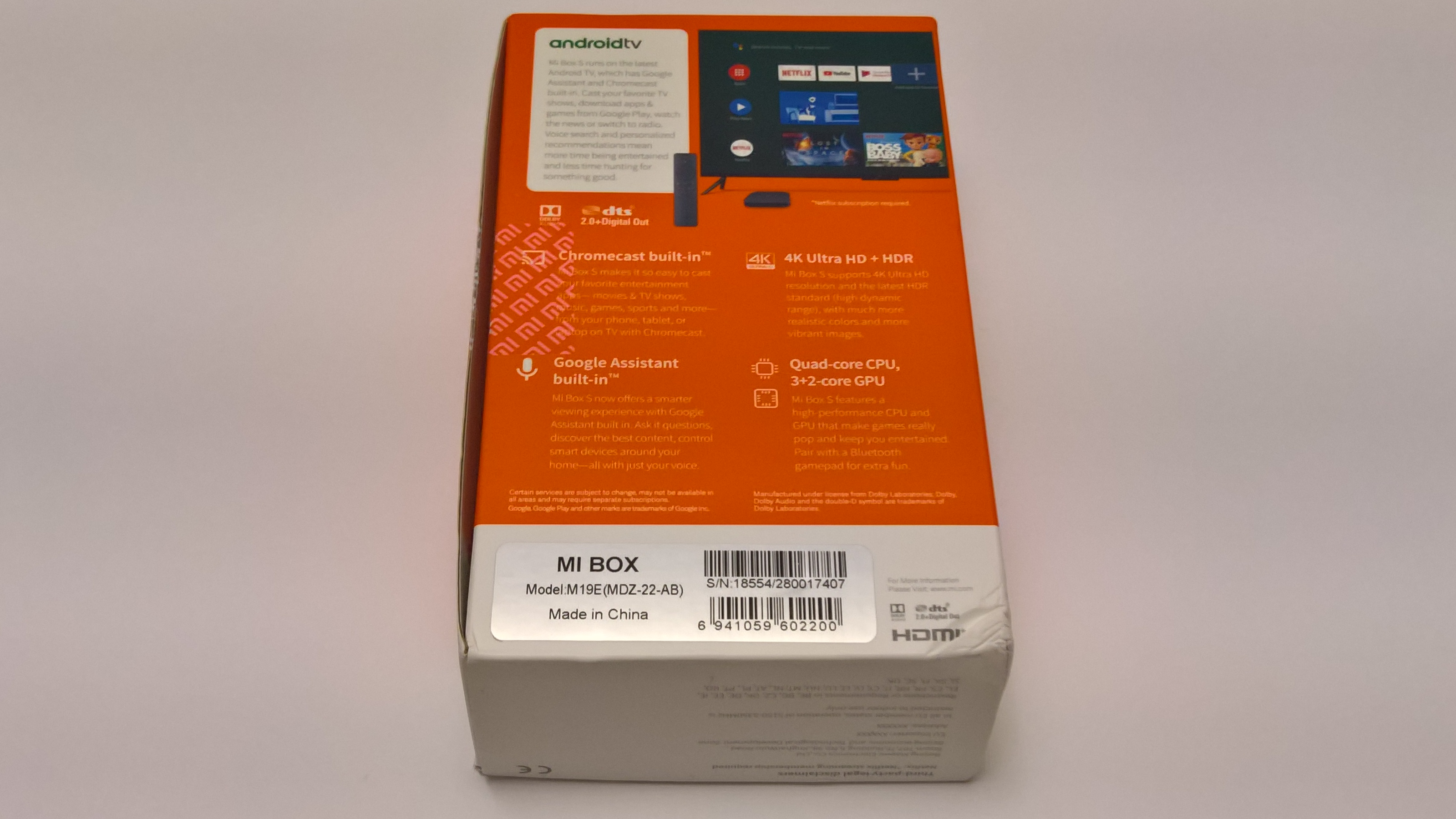
But the similarity of the packages ends there. In the following frames you can see that the quality of the packaging of the new version of the set-top box is significantly inferior to the old one.
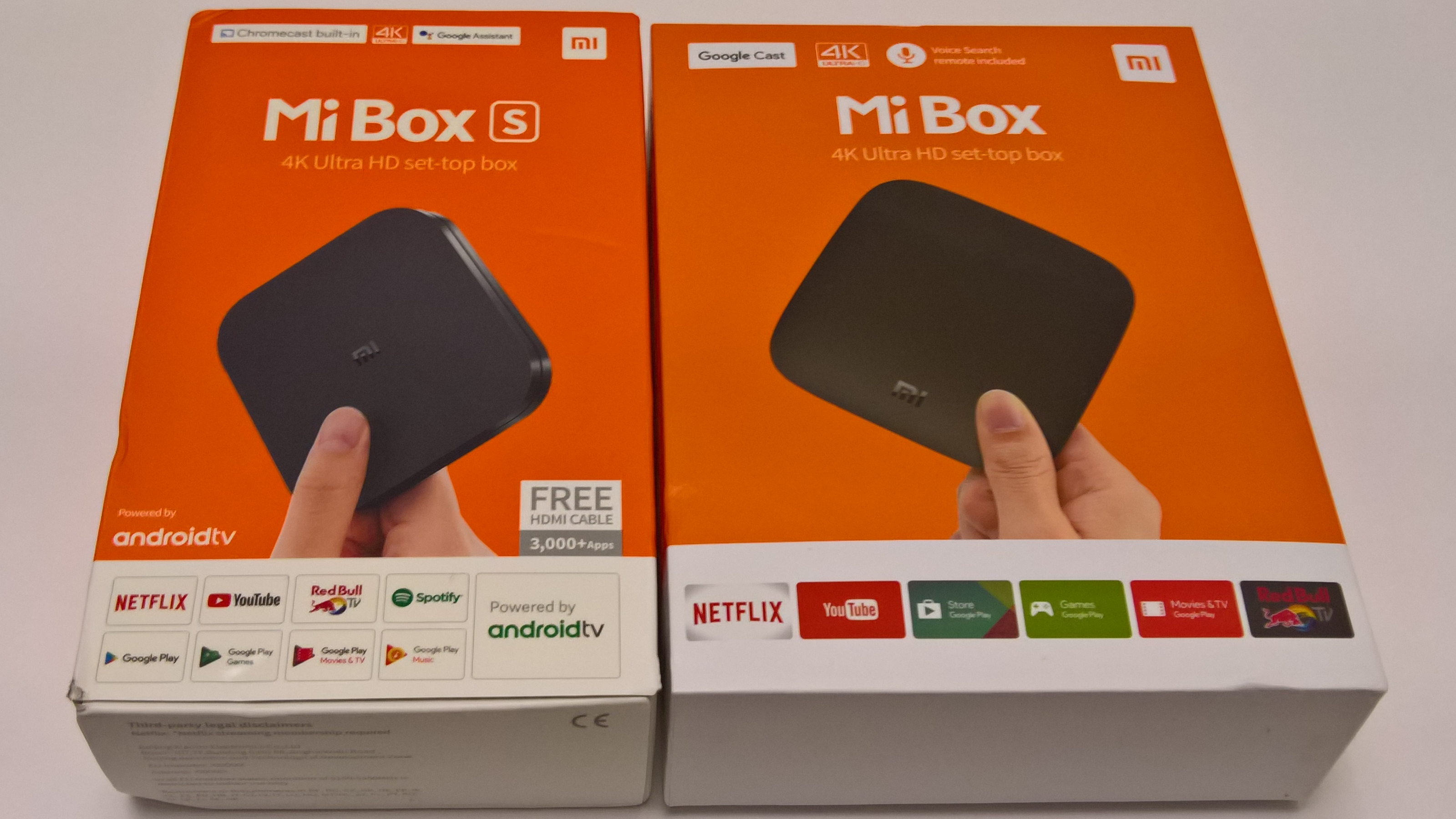

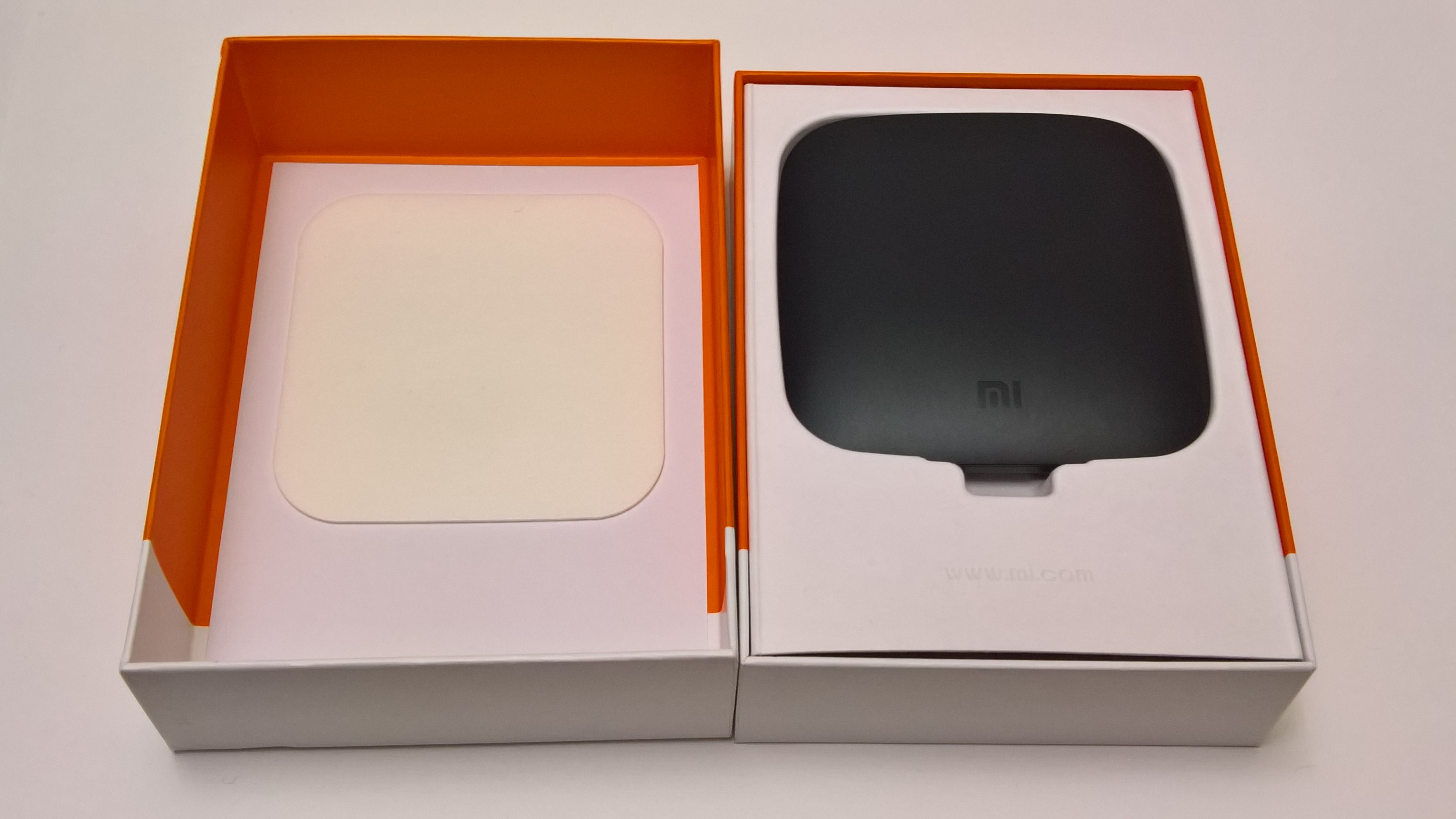
However, we will not focus on the packaging.
After removing the kit from the box and removing the protective films and caps, we obtain the following set:
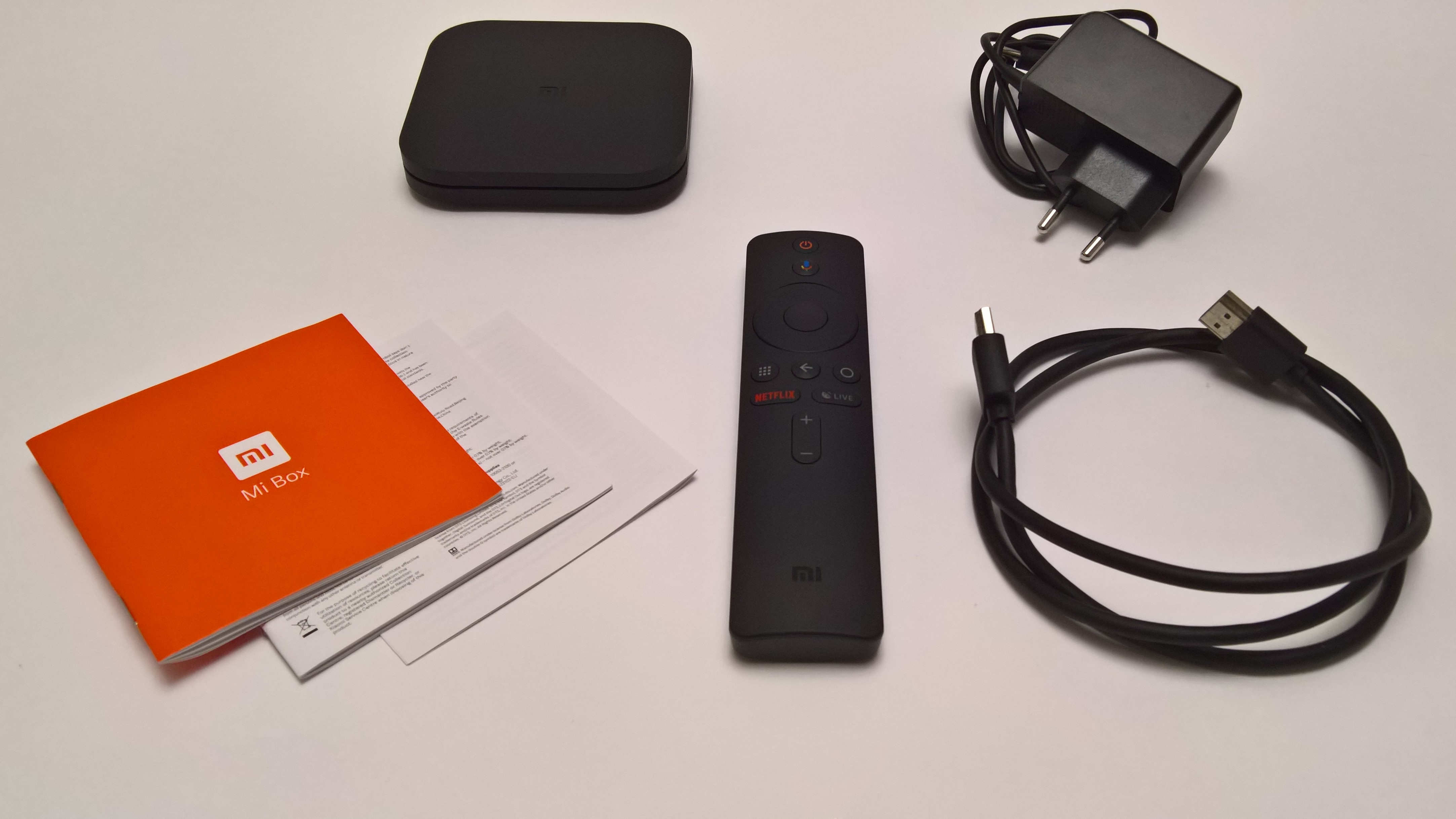
First of all - let's compare the console. In my opinion, the design of the new Mi Box (MDZ-22-AB on the left and MDZ-16-AB on the right) significantly outperforms the old one. However, this is subjective.
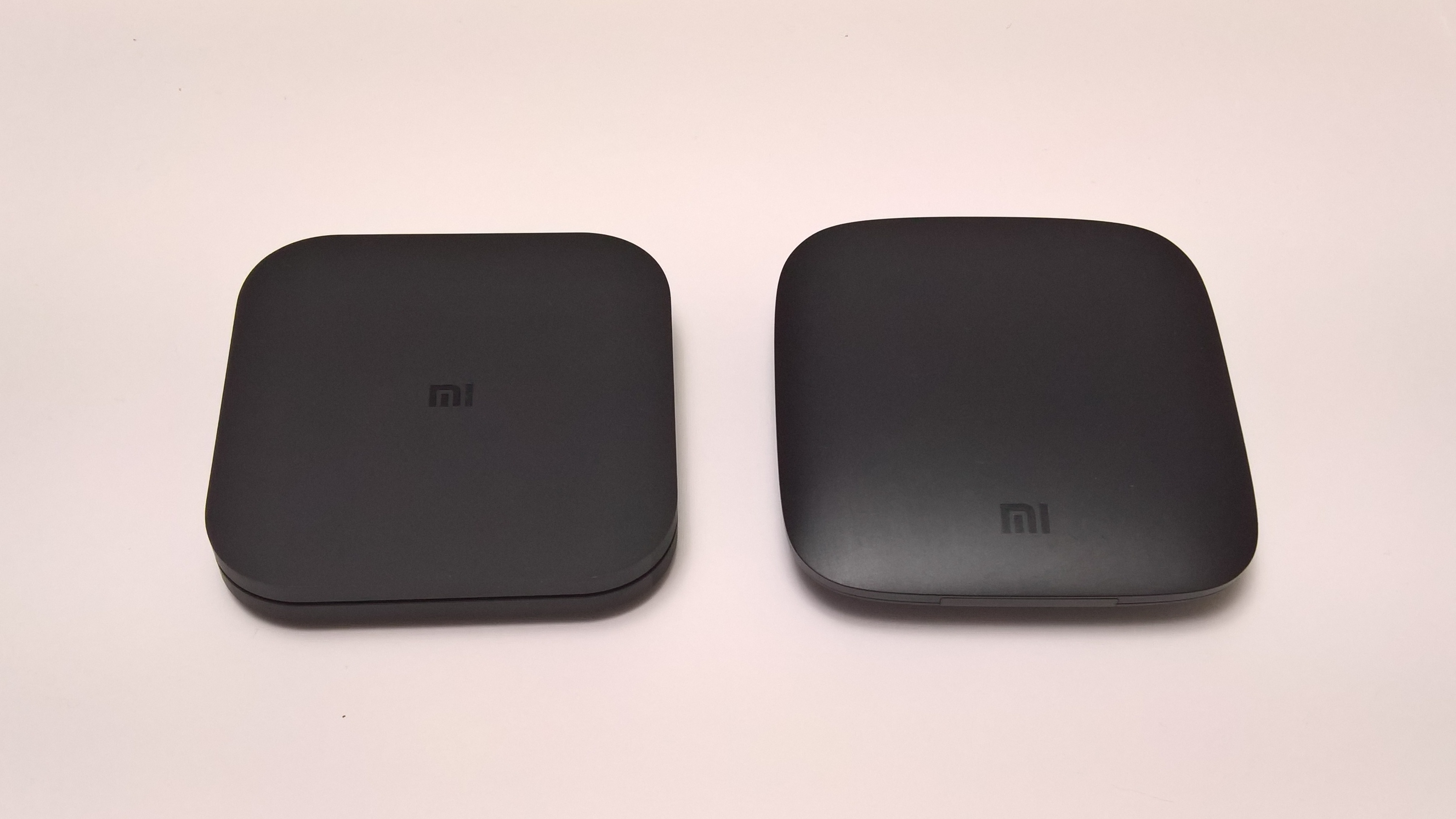
If you look at them objectively, you can mark the legs. The new version has no rubberized elements, whereas the previous one had a full rubberized insert. Because of this, Mi Box S has an extremely weak grip, however, if desired, this problem can be solved by additionally purchasing rubberized elements on the Internet.
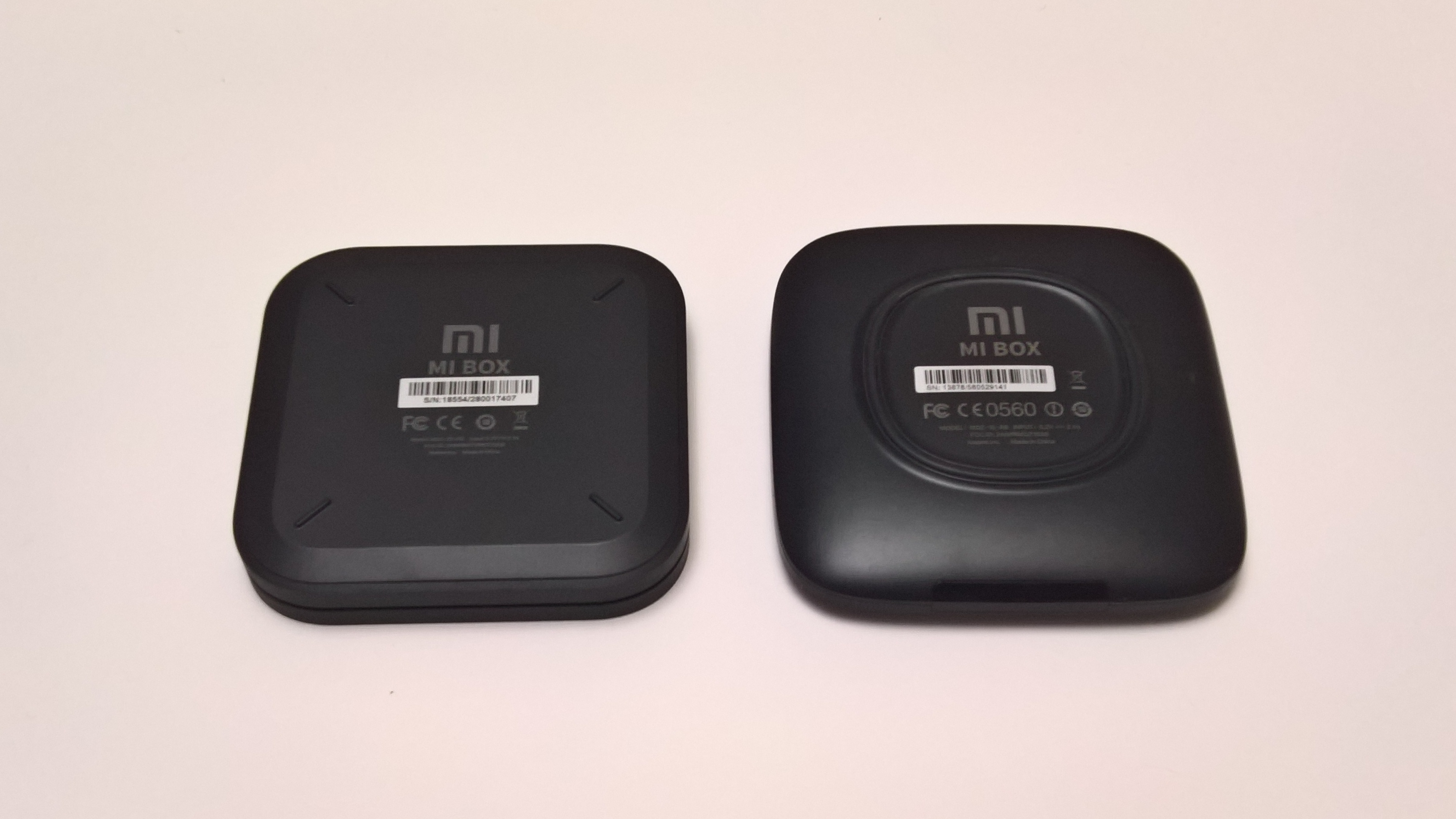
The ports on the Mi Box S are the same as those of the predecessor. Only arranged in a slightly different order (for the new one - “Power, HDMI, USB, Audio output”, for the old one - “Audio output, HDMI, USB, Power”).

Now compare the remote control versions of the MDZ-22-AB (left) and MDZ-16-AB (right). Both consoles are powered by two AAA-batteries (“mizinchikovyh”) and use Bluetooth for their work.
As you can see, the new version of the console received additional buttons (“Netflix”, “Live” and “Applications”), a modified color palette and lost a hole for the strap. In my, subjective, view, the new remote control has become more stylish, but at the same time, it has somewhat moved away from minimalism due to the optional buttons. Separately, I would like to note the quality - the new button has a central button (“Ok”) backlash, while the others have no hint of such a problem. In the old console, the situation is reversed - the central button does not play, and the others have a slight backlash. Perhaps this is just me so lucky.
For the rest, both remote controls are quite comfortable and pleasant to hold in your hand.
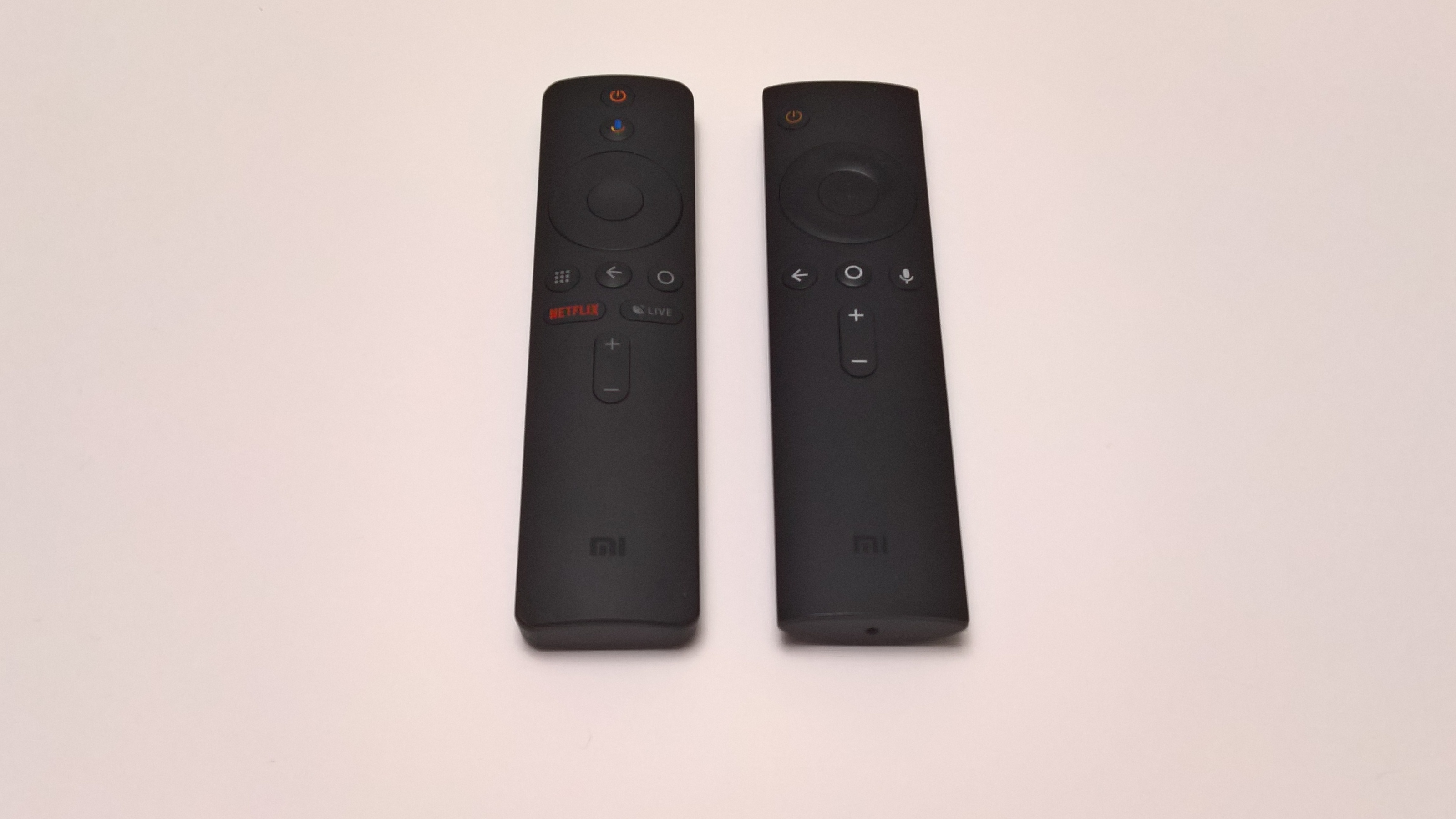

Let's go to the power adapter. It has the following parameters:
Input 100-240V 50 / 60Hz 0.3A
Output 5.2V == 2.1A
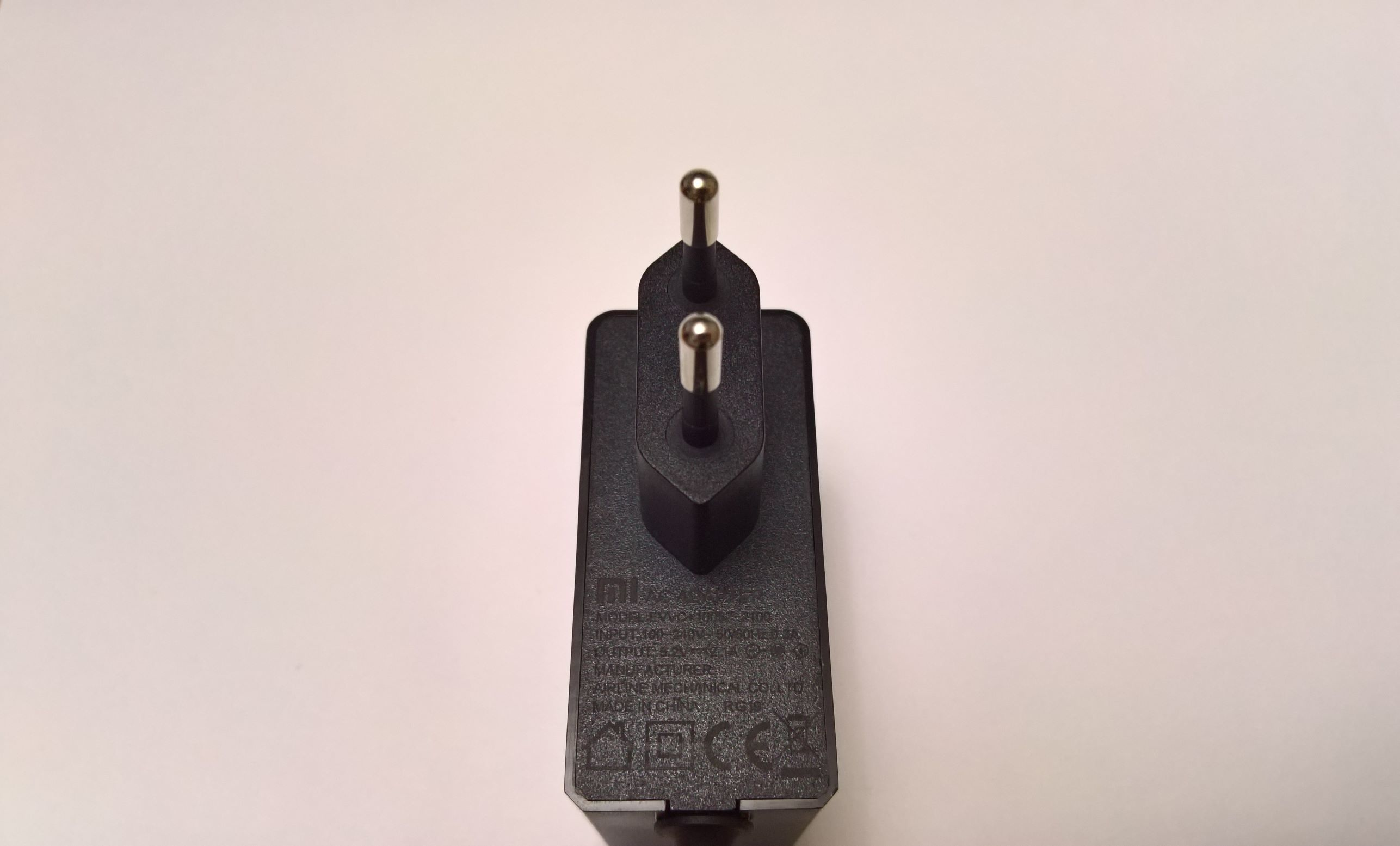
HDMI cable, as in Mi Box 3 (MDZ-16-AB), branded. The length is 1m.

The documentation consists of two booklets and a booklet with information in different languages:
The operating system uses Android TV 8.1, the launcher is Google's Android TV Launcher. Immediately make a digression and say that we should not confuse Android and Android TV. If you do not particularly go into details, then as the main distinctive feature of Android TV, you can highlight a strong bias towards TV (applications, interface, services, management, etc., are adapted for convenient use on TVs).
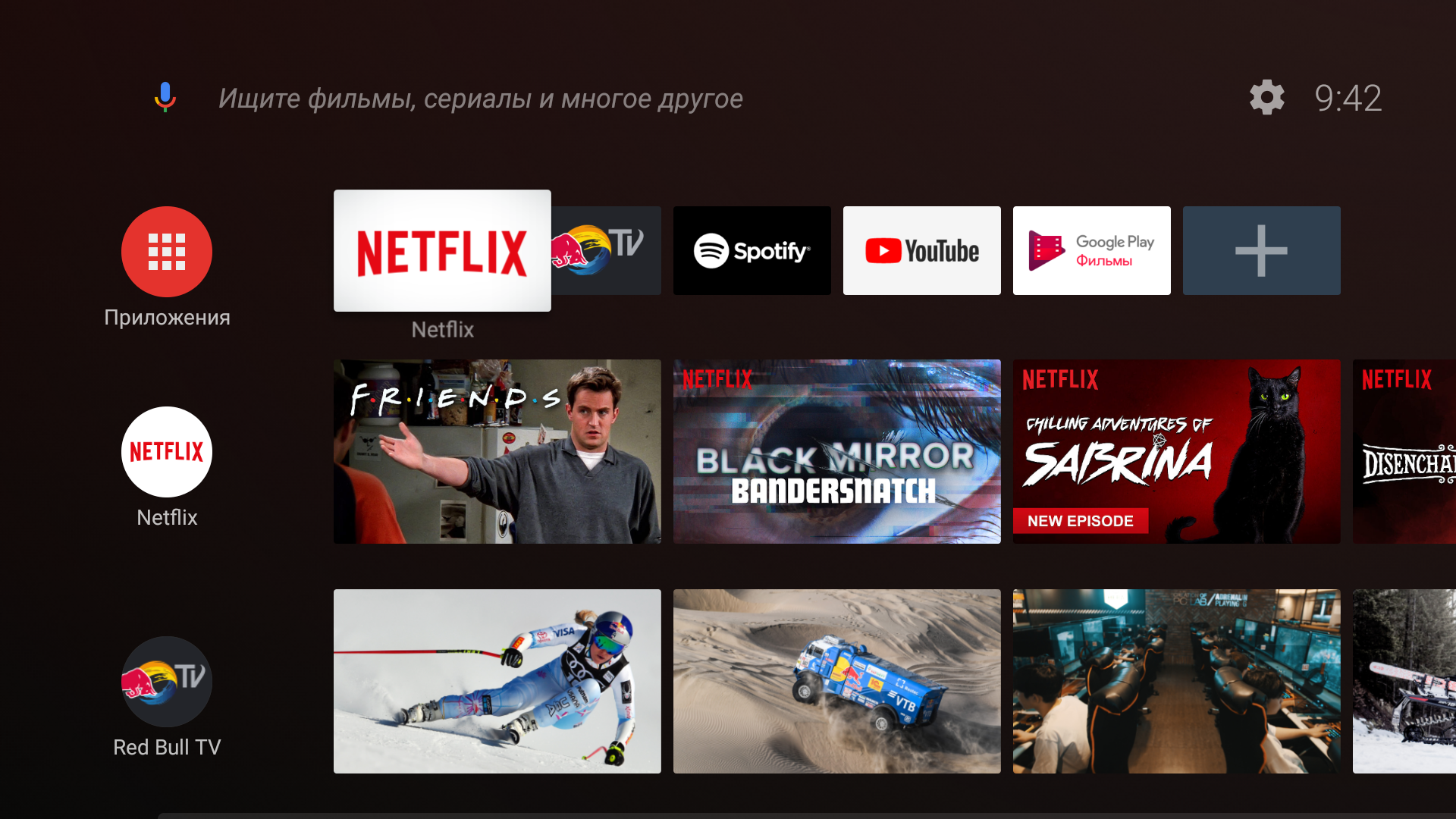

In Android TV 8, the setting of the main screen is implemented very well. Customize the screen "by itself" a matter of a few seconds.
For example, to add an application to the "favorites", just click on the "+" and make a choice, after which it can be easily moved to the right place.
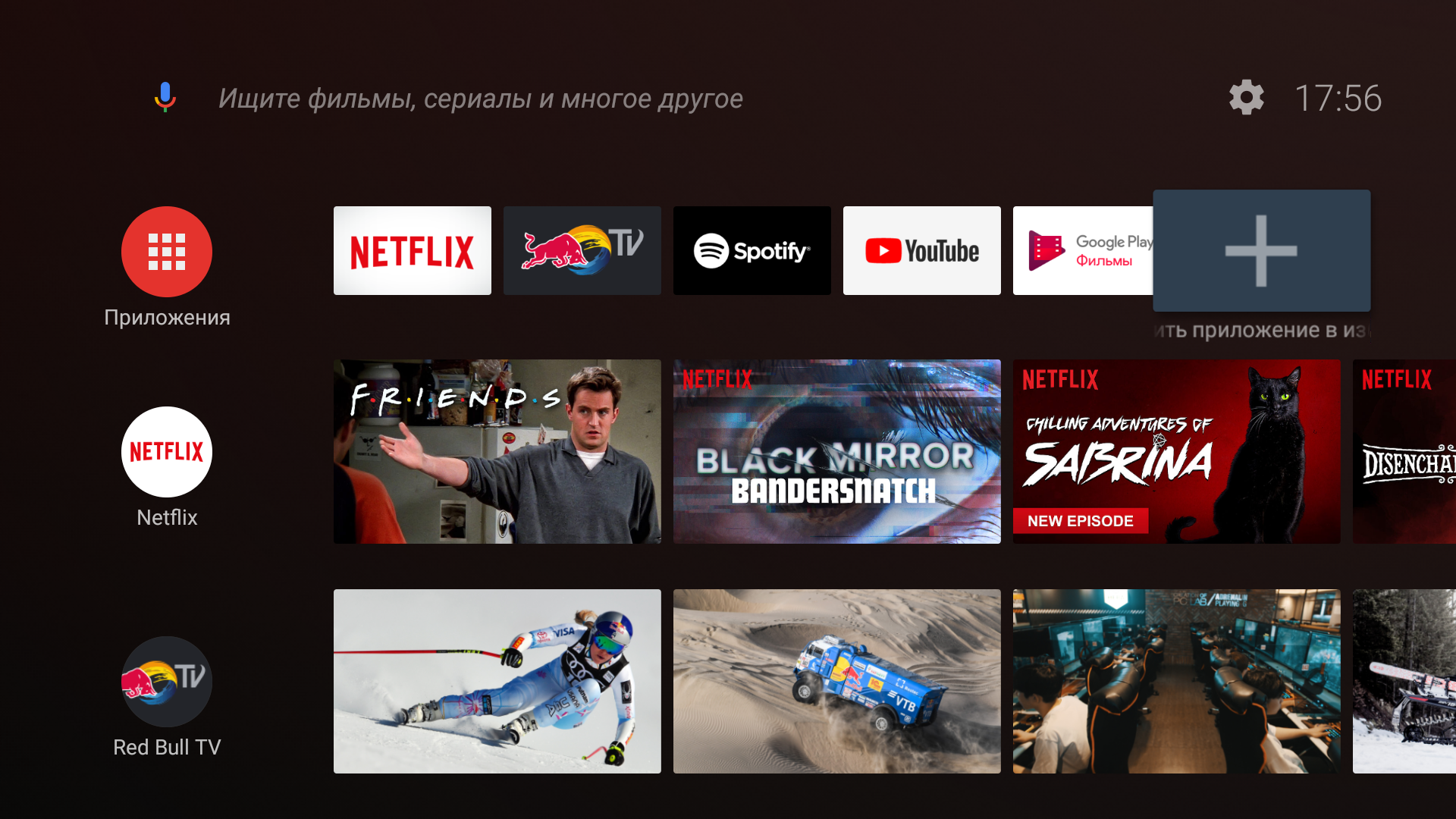
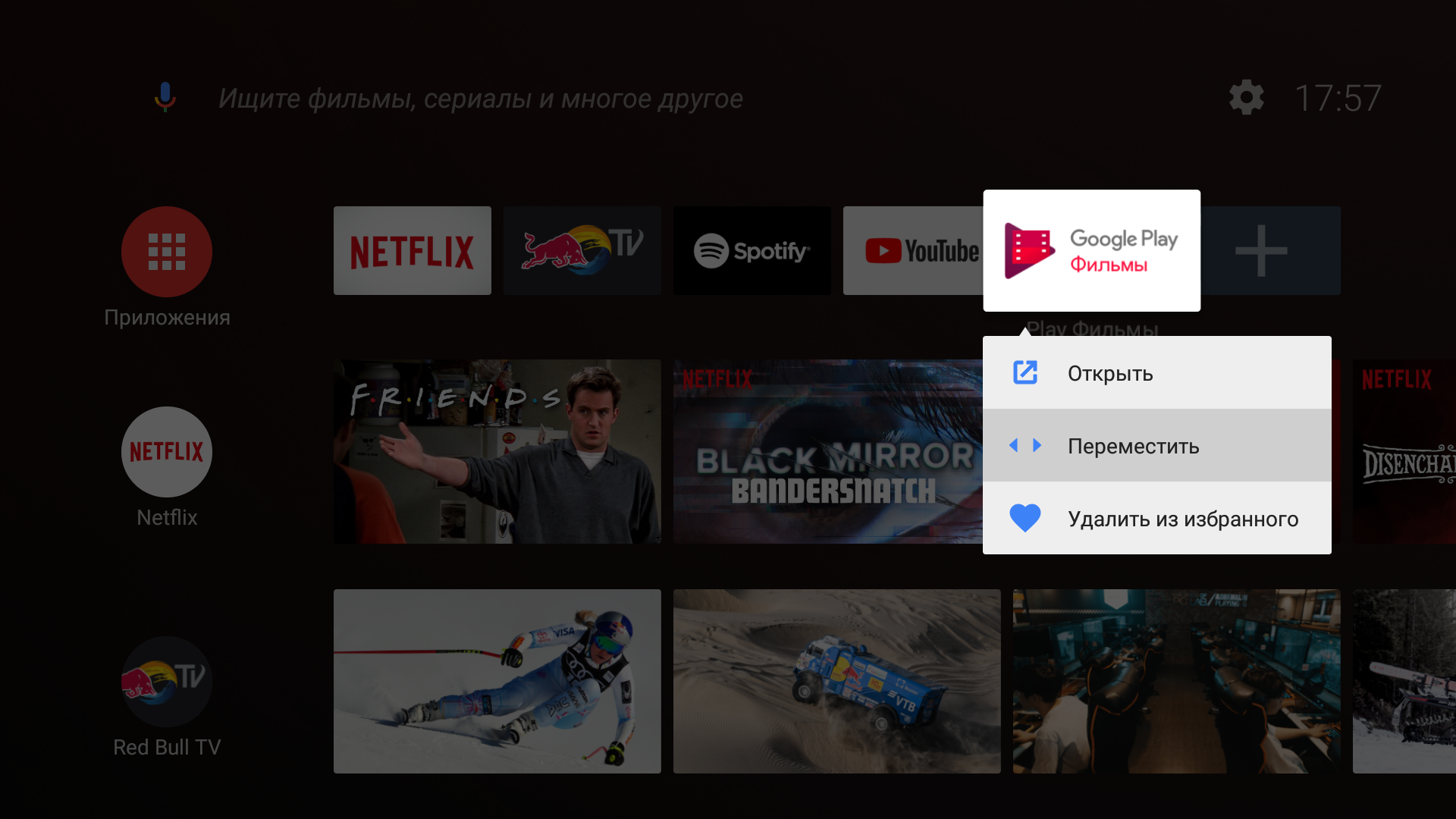
Adding feeds is also easy. To do this, just scroll down the screen and select "Tune channels".
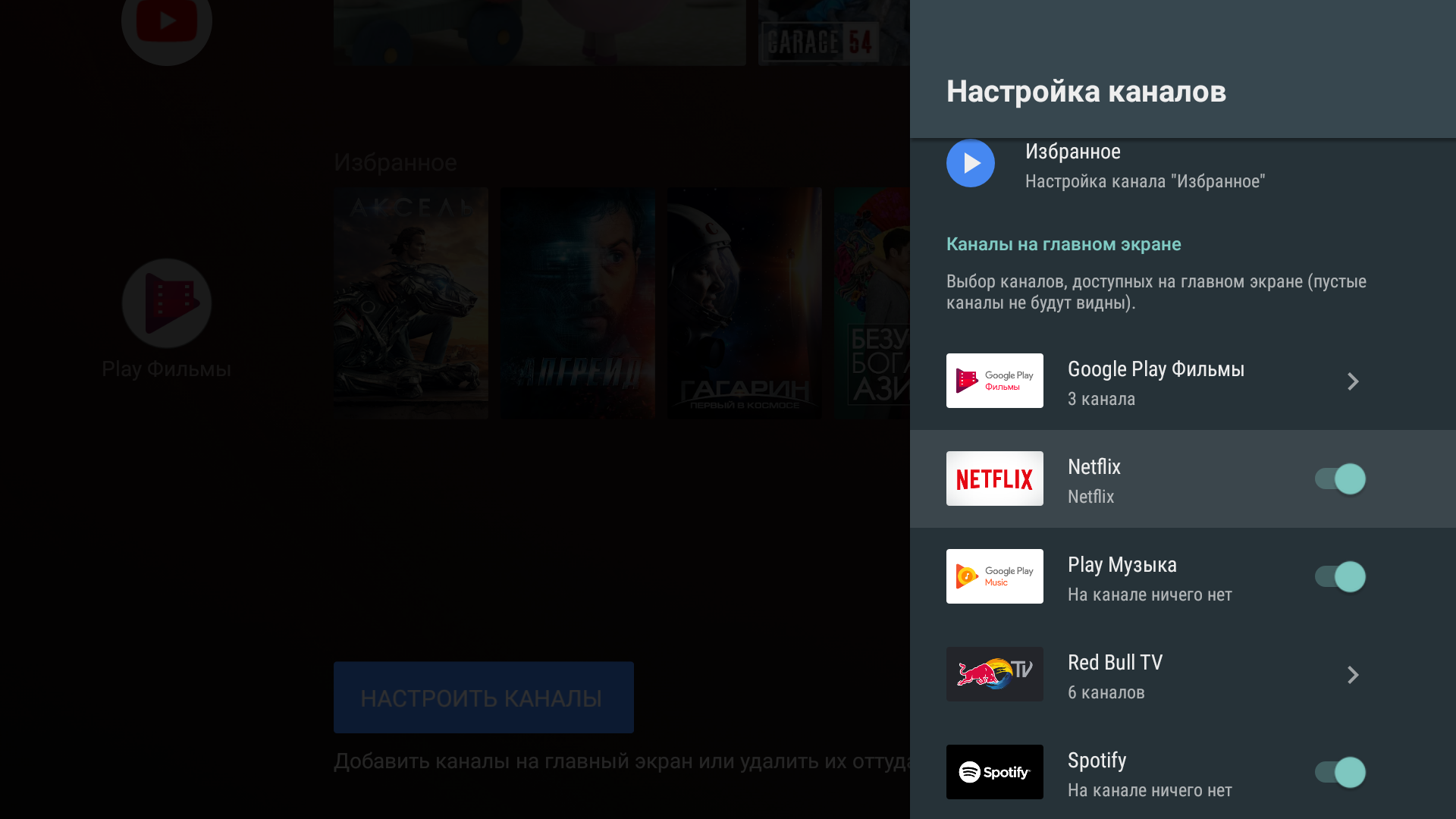
System updates fly through the "air". Usually, they are immediately displayed in a separate window, but if this did not happen, you can go to “ Settings ” -> “ About device ” -> “ System update ”.
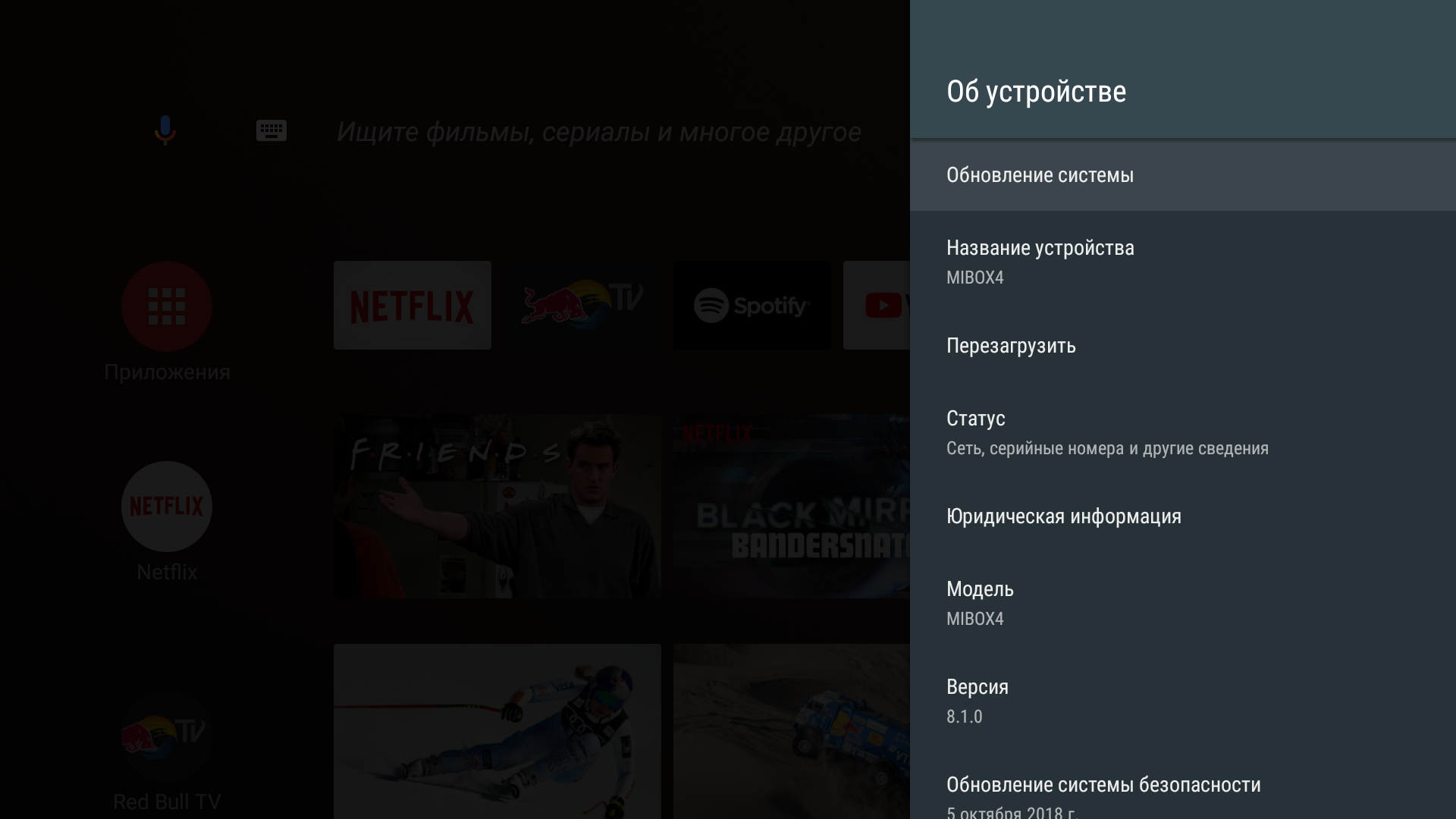
Separately, I want to talk about the distinctive features of Google Play on Android TV. As it was possible to understand from what was written earlier - in Android TV there is a serious emphasis on the use of TVs. The local Google Play contains only those games and applications that are 100% adapted to work on Android TV. Are there many games and applications? Relatively. It all depends on the needs. In my opinion, there are not enough games, but there are more than enough video viewing applications that will satisfy the needs of even the most sophisticated viewer - many Internet cinemas (“ivi”, “tvzavr”, “Amediateka”, “okko”, “Netflix” , “Google Play Movies”, etc.), many individual applications from channels (“CTC-TV Channel”, “First on Android TV”, “NTV-PLUS TV”, etc.) and just countless number of whole services IPTV.
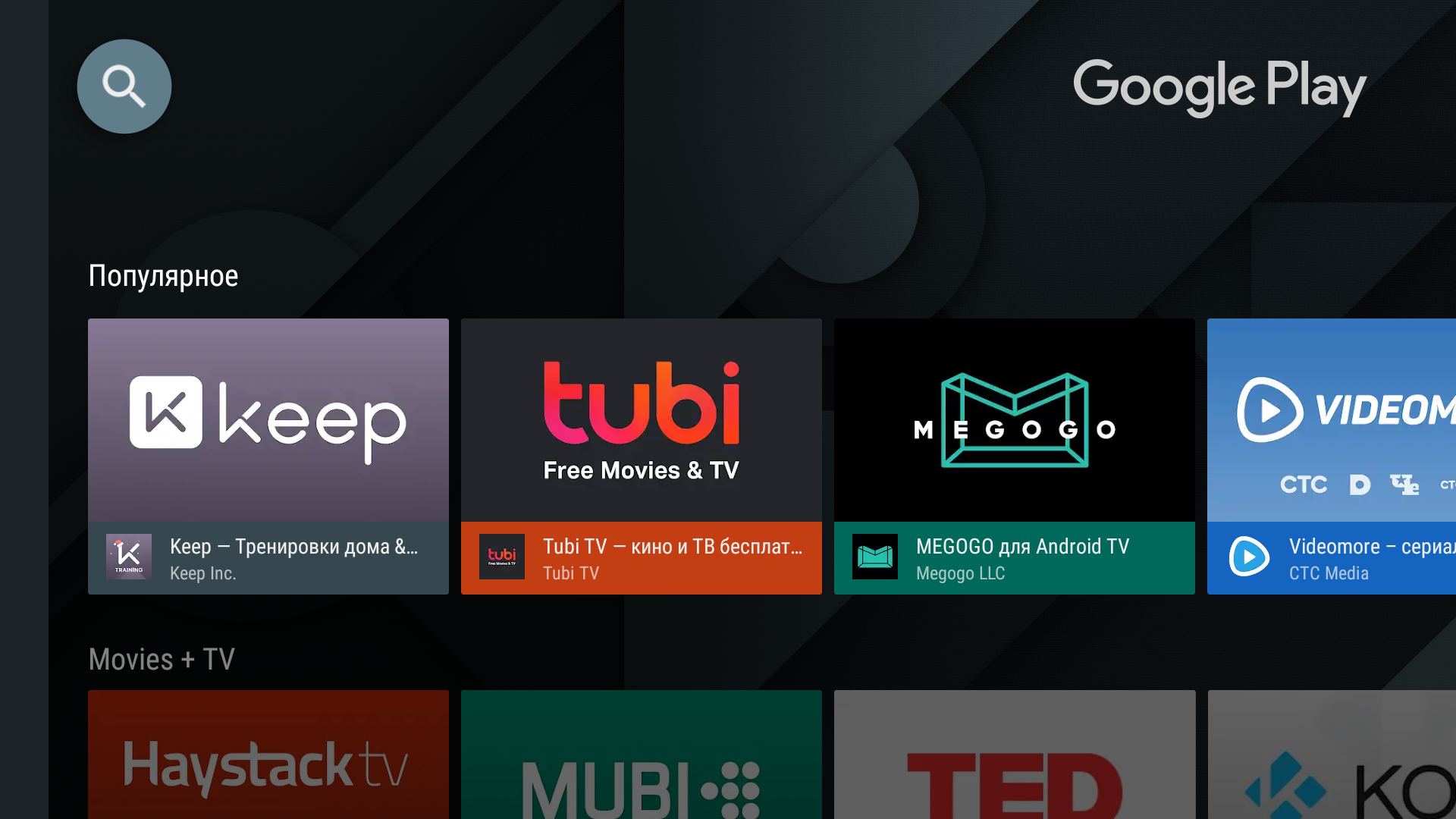
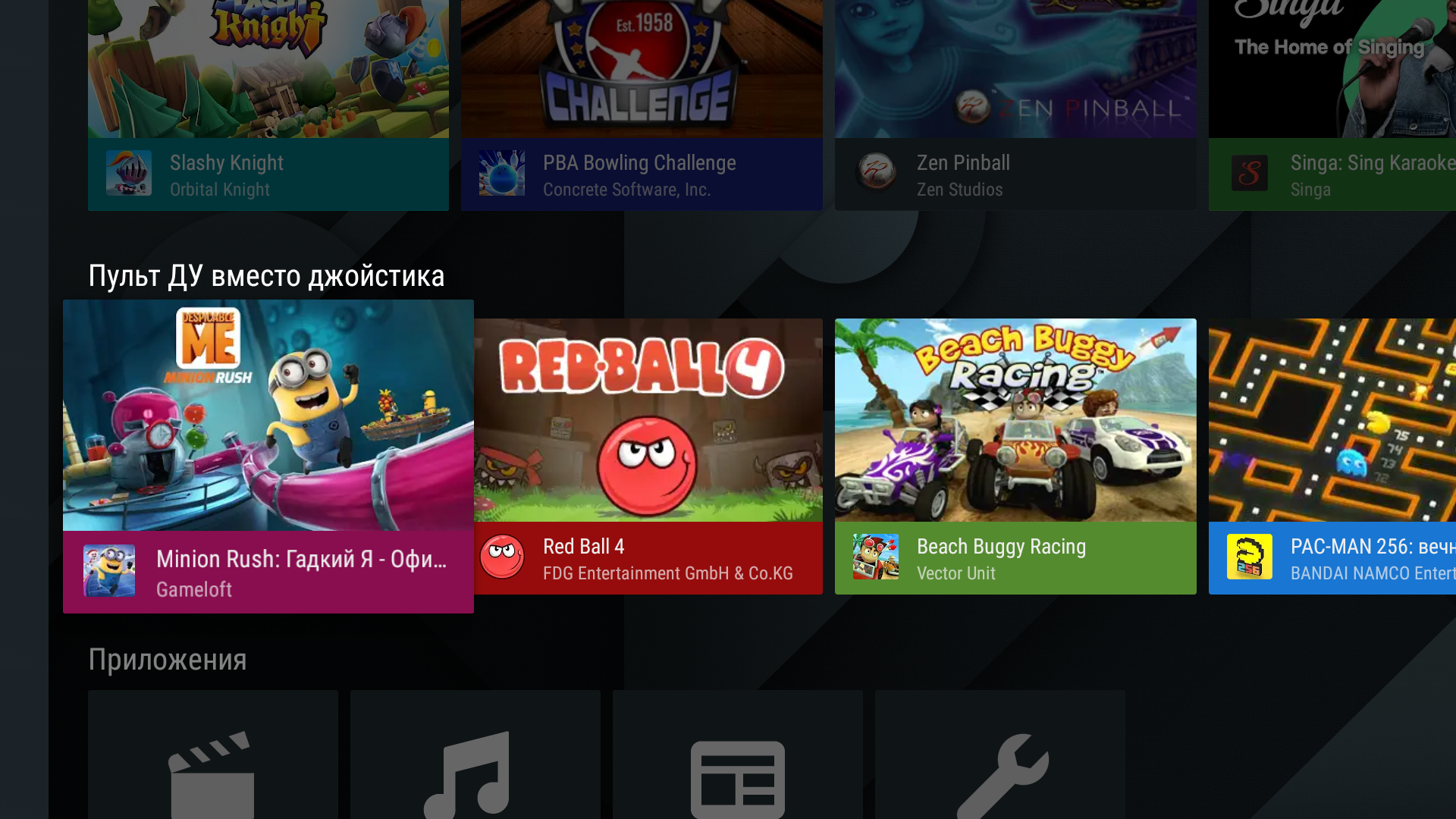
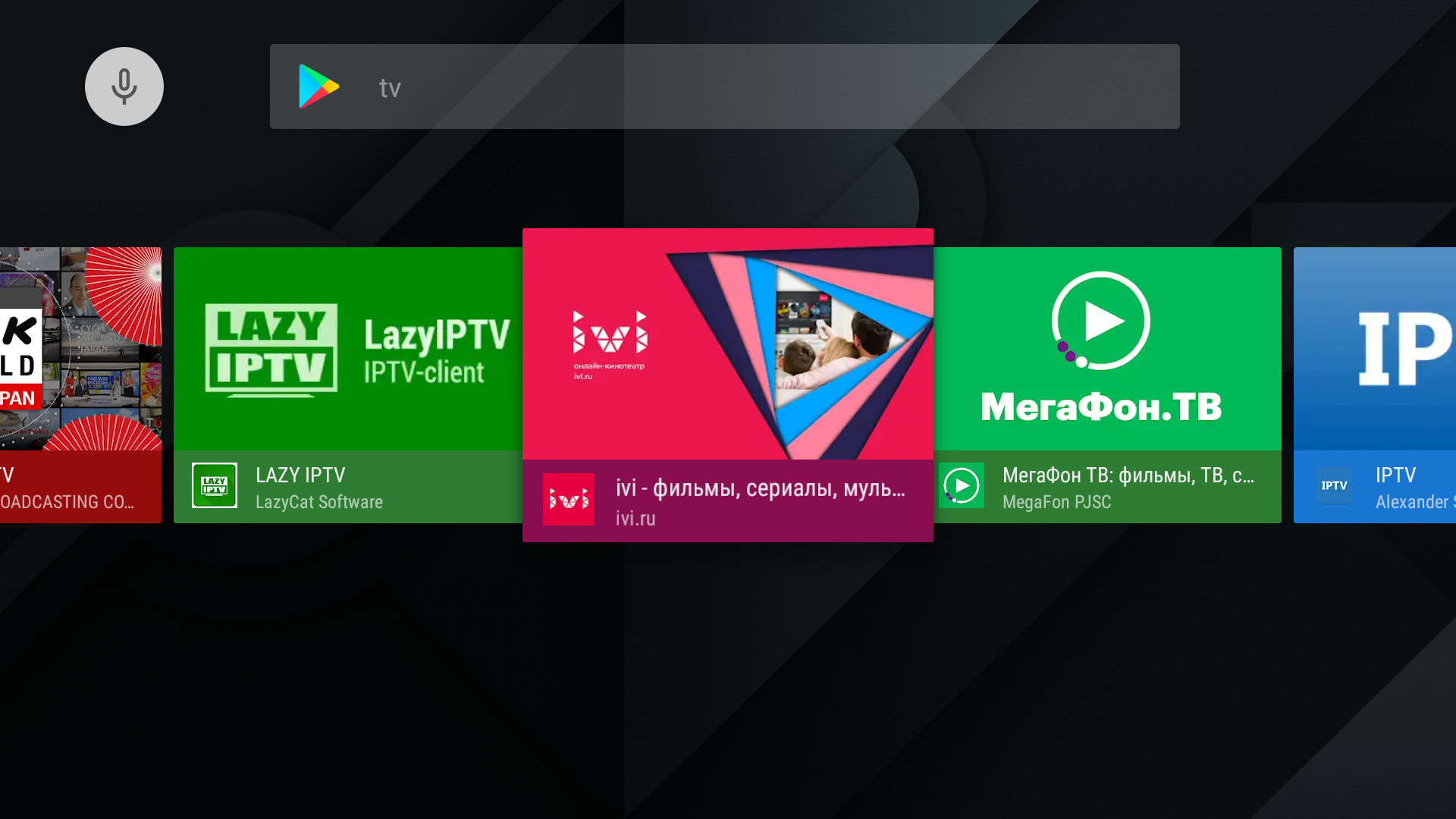
3D Mark. Ice Storm Extreme v1.2


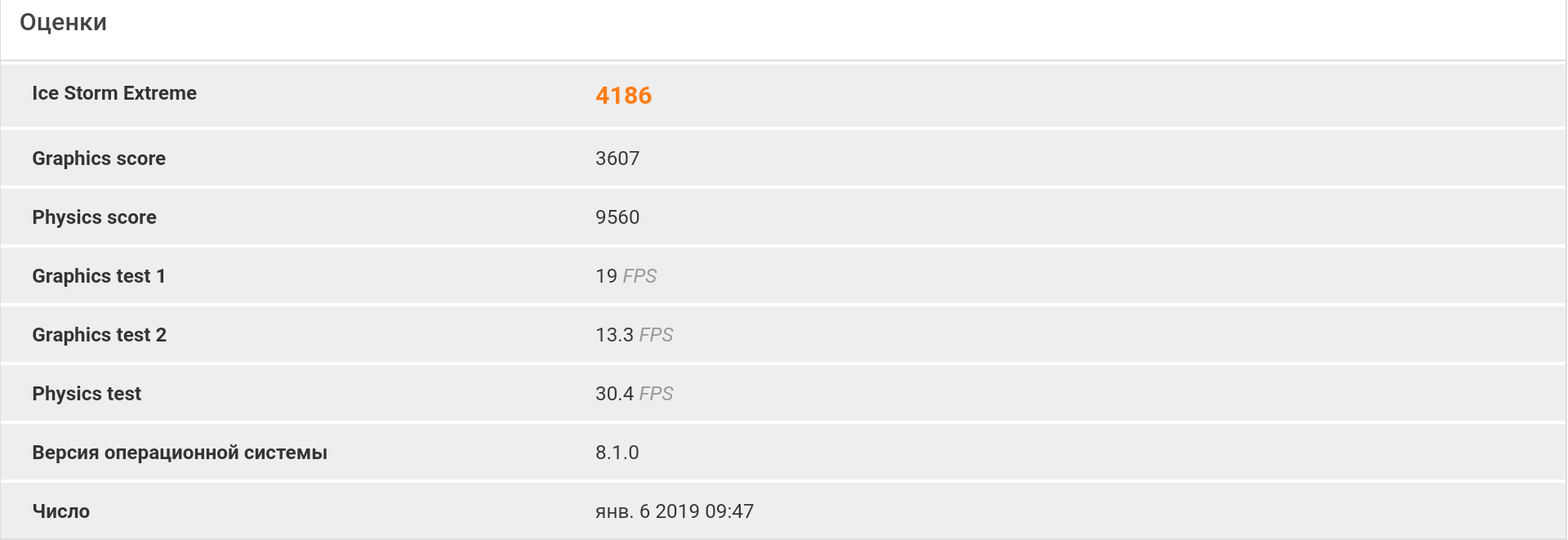
GFXBench GL Benchmark

In conclusion, I would like to consider some points of Android TV, which are often asked in various forums:
1) Are there any problems with the work of YouTube (for example, for some, the application with the ends is “hanging”, and someone just gave out a “green screen”) on Android TV 8.0?
In the case of Mi Box 3, since I updated the prefix to version 8.0, a hangup happened only once or twice. In the case of Mi Box S (Android TV 8.1), I did not observe any problems. However, I do not exclude that such cases are purely individual. Judging by the forums, some users with this problem did not meet at all, and some were less fortunate, and this became their headache.
2) If you connect a keyboard / mouse / gamepad, will they work?
Yes. But since Android TV is still created for TV, keyboard and mouse use may seem quite unusual (and less convenient than when working with a simple PC).
3) Is Android TV "friendly" with .apk, like regular Android?
Yes.
Summing up, I want to say that Mi Box S, in my opinion, is a good prefix, which only slightly bypasses Mi Box 3 (MDZ-16-AB) and, in fact, it has the ability to upgrade to Android TV 9 ( This is only my opinion, but the likelihood that Mi Box 3 will receive an update at least up to 8.1 is very small).
I hope that this review has helped you to understand this issue and to determine whether to switch from Mi Box 3 to S, whether to take Mi Box 3 (or S), or to stop your choice on something else.
(relevant at the time of publication)
Mi Box 3 (MDZ-16-AB) available for $ 55.99
Mi Box S (MDZ-22-AB) available for $ 89.99

Introduction
Mi Box S [MDZ-22-AB] is the international version of Mi Box 4, which is a direct continuation of the international version of the set-top box Mi Box 3 [MDZ-16-AB] . It is distinguished from its predecessor by a modified design and a slight improvement in performance.
Specifications
First of all, let's make a small comparison of the consoles:
| Mi Box 3 [MDZ-16-AB] | Mi Box S [MDZ-22-AB] | |
| Permission to exit | 4K | 4K |
| CPU | Amlogic S905X-H. Quad-core Cortex-A53 | Amlogic S905X-H. Quad-core Cortex-A53 |
| GPU | Mali 450 | Mali 450 |
| RAM | 2GB DDR3 | 2GB DDR3 |
| Flash | 8GB eMMC | 8GB eMMC |
| OS | Android TV 6.0 (update is possible by air up to 8.0) | Android TV 8.1 |
| Wi-Fi | 802.11a / b / g / n / ac; 2.4GHz / 5GHz | 802.11a / b / g / n / ac; 2.4GHz / 5GHz |
| Bluetooth | 4.0 / 3.0 | 4.2 |
| Ports | Nutrition HDMI 2.0a USB 2.0 Audio output (S / PDIF, headphone) | Audio output (S / PDIF, headphone) HDMI 2.0a USB 2.0 Nutrition |
| Equipment | Mi Box Remote control with voice control Power adapter HDMI cable Documentation | Mi Box Remote control with voice control Power adapter HDMI cable Documentation |
As you can see, the difference is not so significant.
Appearance
Like its predecessor, the MDZ-16-AB, the Mi Box S comes in a cardboard box with bright printing (even the design is similar, only the tones are slightly modified).


But the similarity of the packages ends there. In the following frames you can see that the quality of the packaging of the new version of the set-top box is significantly inferior to the old one.

 |  |


However, we will not focus on the packaging.
After removing the kit from the box and removing the protective films and caps, we obtain the following set:

First of all - let's compare the console. In my opinion, the design of the new Mi Box (MDZ-22-AB on the left and MDZ-16-AB on the right) significantly outperforms the old one. However, this is subjective.

If you look at them objectively, you can mark the legs. The new version has no rubberized elements, whereas the previous one had a full rubberized insert. Because of this, Mi Box S has an extremely weak grip, however, if desired, this problem can be solved by additionally purchasing rubberized elements on the Internet.

The ports on the Mi Box S are the same as those of the predecessor. Only arranged in a slightly different order (for the new one - “Power, HDMI, USB, Audio output”, for the old one - “Audio output, HDMI, USB, Power”).

Now compare the remote control versions of the MDZ-22-AB (left) and MDZ-16-AB (right). Both consoles are powered by two AAA-batteries (“mizinchikovyh”) and use Bluetooth for their work.
As you can see, the new version of the console received additional buttons (“Netflix”, “Live” and “Applications”), a modified color palette and lost a hole for the strap. In my, subjective, view, the new remote control has become more stylish, but at the same time, it has somewhat moved away from minimalism due to the optional buttons. Separately, I would like to note the quality - the new button has a central button (“Ok”) backlash, while the others have no hint of such a problem. In the old console, the situation is reversed - the central button does not play, and the others have a slight backlash. Perhaps this is just me so lucky.
For the rest, both remote controls are quite comfortable and pleasant to hold in your hand.


Let's go to the power adapter. It has the following parameters:
Input 100-240V 50 / 60Hz 0.3A
Output 5.2V == 2.1A

HDMI cable, as in Mi Box 3 (MDZ-16-AB), branded. The length is 1m.

The documentation consists of two booklets and a booklet with information in different languages:
- "Terms of use and Xiaomi policy" (in fact - warranty information);
- “Product Information” (declaration of conformity, disposal rules, etc.);
- “Package and installation guide” (illustrations with package and connection rules - HDMI to HDMI, power to power, etc.).
operating system
The operating system uses Android TV 8.1, the launcher is Google's Android TV Launcher. Immediately make a digression and say that we should not confuse Android and Android TV. If you do not particularly go into details, then as the main distinctive feature of Android TV, you can highlight a strong bias towards TV (applications, interface, services, management, etc., are adapted for convenient use on TVs).


Home Screen Setup
In Android TV 8, the setting of the main screen is implemented very well. Customize the screen "by itself" a matter of a few seconds.
For example, to add an application to the "favorites", just click on the "+" and make a choice, after which it can be easily moved to the right place.


Adding feeds is also easy. To do this, just scroll down the screen and select "Tune channels".

Updates
System updates fly through the "air". Usually, they are immediately displayed in a separate window, but if this did not happen, you can go to “ Settings ” -> “ About device ” -> “ System update ”.

Google play
Separately, I want to talk about the distinctive features of Google Play on Android TV. As it was possible to understand from what was written earlier - in Android TV there is a serious emphasis on the use of TVs. The local Google Play contains only those games and applications that are 100% adapted to work on Android TV. Are there many games and applications? Relatively. It all depends on the needs. In my opinion, there are not enough games, but there are more than enough video viewing applications that will satisfy the needs of even the most sophisticated viewer - many Internet cinemas (“ivi”, “tvzavr”, “Amediateka”, “okko”, “Netflix” , “Google Play Movies”, etc.), many individual applications from channels (“CTC-TV Channel”, “First on Android TV”, “NTV-PLUS TV”, etc.) and just countless number of whole services IPTV.



Performance tests
3D Mark. Ice Storm Extreme v1.2



GFXBench GL Benchmark

Other moments
In conclusion, I would like to consider some points of Android TV, which are often asked in various forums:
1) Are there any problems with the work of YouTube (for example, for some, the application with the ends is “hanging”, and someone just gave out a “green screen”) on Android TV 8.0?
In the case of Mi Box 3, since I updated the prefix to version 8.0, a hangup happened only once or twice. In the case of Mi Box S (Android TV 8.1), I did not observe any problems. However, I do not exclude that such cases are purely individual. Judging by the forums, some users with this problem did not meet at all, and some were less fortunate, and this became their headache.
2) If you connect a keyboard / mouse / gamepad, will they work?
Yes. But since Android TV is still created for TV, keyboard and mouse use may seem quite unusual (and less convenient than when working with a simple PC).
3) Is Android TV "friendly" with .apk, like regular Android?
Yes.
Conclusion
Summing up, I want to say that Mi Box S, in my opinion, is a good prefix, which only slightly bypasses Mi Box 3 (MDZ-16-AB) and, in fact, it has the ability to upgrade to Android TV 9 ( This is only my opinion, but the likelihood that Mi Box 3 will receive an update at least up to 8.1 is very small).
I hope that this review has helped you to understand this issue and to determine whether to switch from Mi Box 3 to S, whether to take Mi Box 3 (or S), or to stop your choice on something else.
Prices
(relevant at the time of publication)
Mi Box 3 (MDZ-16-AB) available for $ 55.99
Mi Box S (MDZ-22-AB) available for $ 89.99
More posts:
All Posts